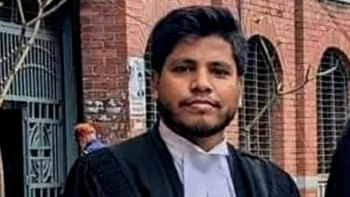Change Maker: Breaking the drug cycle

Until four years ago, 32-year-old housewife Sohagi from Rajshahi city's Guripara was happy with her life. Her husband Motiur Rahman was a plumber. Family expenses were met. It changed when Motiur fell from a three-storied building and broke his backbone. Unable to work, he spent idle hours at home. Guripara was a haven for drugs then. Motiur became a heroin addict and later a dealer. He involved Sohagi in the trade. Her dream of a quiet life was shattered.
“I had no time for my son,” she recalls. “Police chased us. Neighbours hated us. We wanted a normal life. Nobody listened.”
The situation seemed hopeless. But in November last year, Motiur and Sohagi, along with all the drug dealers in Rajshahi city, were offered a life-changing second chance from a most unexpected quarter: the city's police commissioner.
Md Shafiqul Islam was first appointed commissioner of the Rajshahi Metropolitan Police in June 2016. He knew firsthand how drugs destroy lives. The young son of a close relative, who had once been a meritorious student, was forced to abandon studies after addiction caused the boy to become blind.
Shafiqul also knew that proceeds of drugs can be used to finance terrorism, and that Rajshahi has a history of militancy. He was determined to attack the city's drug problem.
“Rajshahi had for long been troubled by drugs,” said the police chief in an interview. “The city suffers for its location beside the Indian frontier and for the many potential users in its crowded streets.”
He pursued the usual approach: intensified police drives.
After three months it achieved predictable results: a great number of arrests, court cases and drug seizures; but the overall situation, Shafiqul was forced to admit, was unchanged. There had to be a better way.
“When engaging in drug dealings,” Shafiqul explains, “a person must face criminal cases. Along with covering family expenses they then need extra money to pay lawyers and some corrupt police officers. Often the dealer will land in jail for some months; but when they get out they jump right back into dealings to recover their losses.”
“A dealer's life runs in a cycle of jail, release, reengaging in the drug trade and going back to jail,” he continues. “They can't escape that cycle even if they wish. That's why police drives don't work.”
“In order to break the cycle,” says Shafiqul, “I needed to develop confidence among the dealers that police would help if they stopped.”
From September 2016 Shafiqul began to implement his innovative approach, starting by motivating police officers. He held awareness meetings in drug-infested parts of the city, and on November 14, 2016 at Char Majhardiar, he made the first call for dealers to surrender.
Only 41 dealers responded; another 43 surrendered a month later in Panchabati. Shafiqul greeted them with sweets and flowers. “Many needed immediate rehabilitation,” he recalls.
The police commissioner didn't stop there. He met with lawyers to secure an agreement that their cases would be dealt with almost for free; and with doctors who would prioritise arranging treatment.
Several government and non-government organisations became involved, offering everything from sewing machines to rickshaw vans, providing training in electrical skills, weaving and handicrafts, giving jobs and even cash to aid rehabilitation.
By March 22 this year, out of 600 listed dealers from across the city, 307 surrendered.

Sohagi surrendered in January. Police arranged treatment for Motiur and helped her secure an NGO loan. She built a shop for her husband to sell chickens. She enrolled her son in school. Police provided her with a sewing machine and she is completing weaving training. In every respect the family's future has turned from bleak to bright.
“The police commissioner has done so much for us,” says Sohagi. “We are obliged to refrain from drug dealing forever.”
Shafiqul says he will never forget the smile on Sohagi's face after her husband returned, cured.
Solving Rajshahi's drug problem is far from complete. “We have to consider resources,” says Shafiqul, who notes that only 72 of the dealers who have surrendered have been fully rehabilitated. He is now working on establishing a cottage industry cooperative for former dealers to better help themselves.
Nonetheless, his innovative strategy shows promise. “Of those rehabilitated,” he says, “only five returned to the illegal business. When they do, they face tougher legal sanction.”
Shafiqul's good work has been noticed. The police headquarters in Dhaka have instructed police across the country to follow his example. Prime Minister Sheikh Hasina in a video conference expressed her appreciation.



 For all latest news, follow The Daily Star's Google News channel.
For all latest news, follow The Daily Star's Google News channel. 



Comments